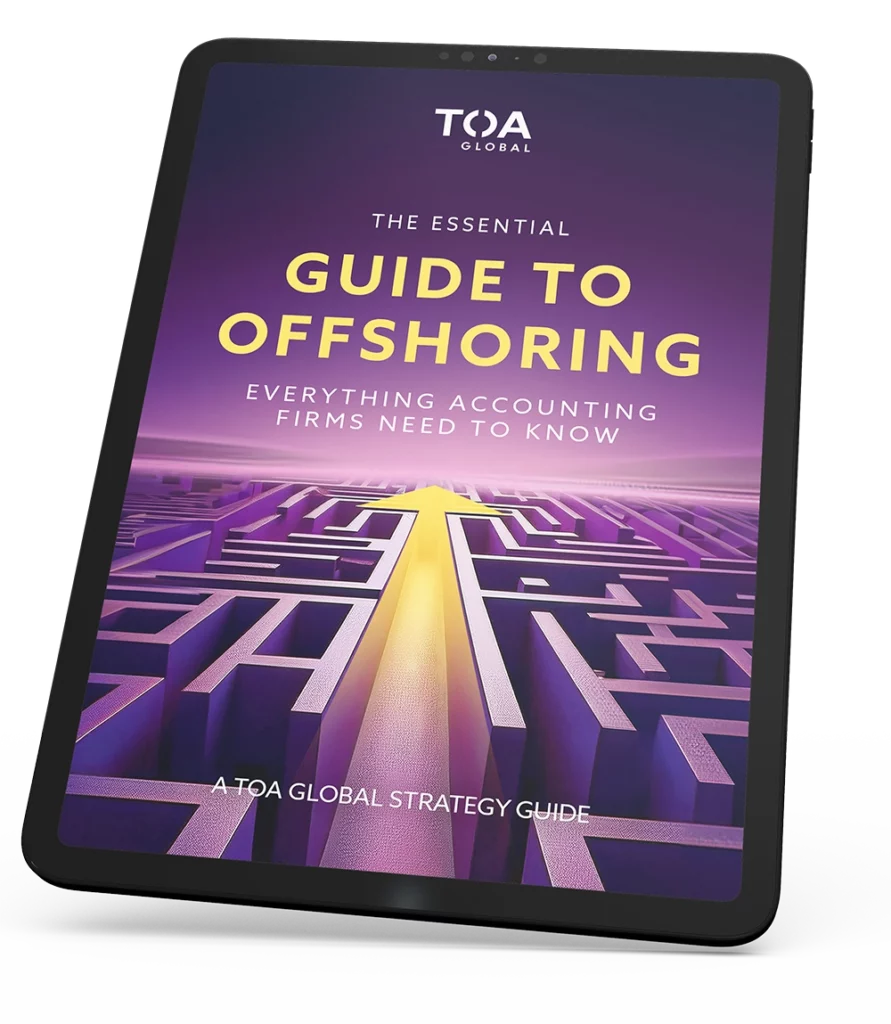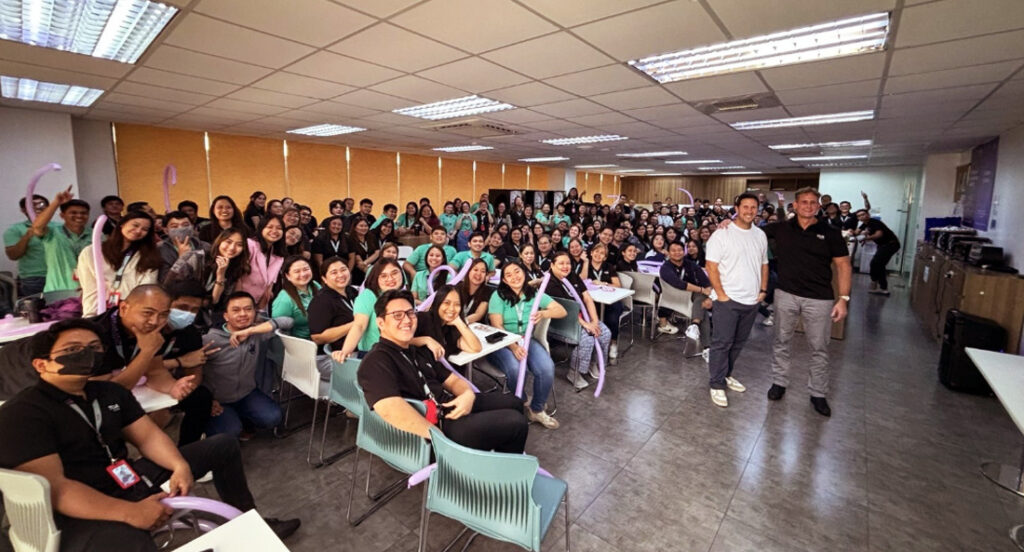Offshore Accounting for CPA Firm Owners: How to Do It Properly

As the founder of TOA Global and former CEO, I’ve witnessed how offshore accounting can transform accounting firms. I worked with over 1,100 firm owners during my tenure, helping them build high-performing offshore teams that improved efficiency and drove significant business growth.
Offshoring is no longer just an experimental service—it’s a proven strategy that, when executed correctly, can help your firm thrive despite the current accounting talent shortage in the industry.
Over the years, I’ve seen common pitfalls, remarkable success stories, and innovative strategies firms use to leverage offshore accounting talent. In this guide, I’ll share insights from those experiences to help you successfully offshore your accounting operations. Whether trying offshore accounting services for the first time or expanding an existing team, this guide offers practical advice to set you up for success.
What Is Offshore Accounting?

Offshore accounting refers to delegating specific accounting processes or tasks to a team or offshore accounting service providers based in another country. For many firms, this involves outsourcing functions to professionals in countries like the Philippines, India, or Eastern Europe. These destinations are known for their skilled labor force, cost advantages, and robust infrastructure for supporting global business operations.
However, offshore accounting is more than a transactional relationship. It’s about integrating an offshore accounting staff into your firm’s culture and operations so that they become an extension of your business.

Download TOA Global’s Free eBook:
The Essential Guide to Offshoring Everything Accounting Firms Need to Know
The Benefits of Offshoring for Accounting Firms

There’s a reason so many accounting firms are turning to offshore accounting services. Here are some of the key benefits of offshore accounting:
1. Cost Efficiency Without Compromising Quality
Labor costs in countries like the Philippines are significantly lower than in the U.S., Australia, or the U.K. This doesn’t mean you’re sacrificing quality. In fact, offshore accountants are often highly qualified and have extensive experience in international accounting processes and standards.
2. Access to a Global Talent Pool
83% of CFOs and other senior leaders believe there’s still an accounting talent shortage, according to the CFO Pulse report by Personiv. That’s 13% more than two years ago.
The competition for skilled accountants—not just locally but internationally—is getting worse, but offshoring opens up a much larger talent pool. Offshore accounting professionals are well-versed in international accounting standards, accounting tools like QuickBooks and Xero, and compliance requirements across multiple jurisdictions.
3. Scalability for Growth
Offshoring allows you to scale your team up or down as needed. Whether it’s tax season or a period of rapid growth, having an offshore accounting team gives you the flexibility to adjust your workforce without the overhead costs of hiring locally.
4. Focus on High-Value Work
By offshoring routine and time-consuming tasks, your onshore team can focus on strategic, high-value activities like client advisory, business development, and relationship management.
5. Improved Work-Life Balance

Not having a work-life balance has always been a top pain point for accountants. Offshore accounting helps redistribute workloads, reducing burnout and improving morale within your onshore team.
How to Offshore Accounting the Right Way

Offshore accounting is a strategic move, but its success hinges on how you approach it. One of the biggest mistakes I’ve seen accounting firm owners make is focusing on hiring for roles rather than identifying tasks. When you start with a broad role—like “accountant” or “bookkeeper”—it’s easy to overlook the specifics of what needs to be done.
This can lead to inefficiencies, frustration, and a lack of clarity for your offshore accounting team. Instead, the key is to break down your processes and identify which tasks should be handled locally and which can be offshored. By focusing on tasks, you create a clearer roadmap for your team and set yourself up for faster, more effective implementation.
Start by Identifying Tasks, Not Roles
The first step is to step back and map out your firm’s workflows. Consider everything from routine daily tasks to more complex accounting tasks and processes. Ask yourself:
- Which tasks are repetitive, time-consuming, or administrative?
- Which tasks require face-to-face interaction or a deep understanding of local regulations?
- Which tasks demand high-level strategy or client-facing expertise?
From there, categorize these tasks into two groups:
- Tasks to Be Done Locally by Your Onshore Team – These are high-value, client-facing, or strategic activities that require your onshore team’s expertise and deep understanding of the clients.
- Tasks to Be Offshored to Your Global Team – Routine, process-driven, or administrative tasks that don’t require a physical presence or deep local knowledge.
Focus on Routine Tasks First
When building an offshore accounting team, start with routine and mundane tasks. Here are the common offshoring accounting services that you should include:
- Bookkeeping – Daily transactional accounting tasks like data entry, bank reconciliations, and AP/AR are perfect for offshoring. These accounting tasks require precision and consistency but don’t necessarily need to be handled onshore.
- Payroll Processing – Payroll processing is a repetitive and time-sensitive task that offshore accounting teams can manage effectively, ensuring compliance with regulations and timely payments.
- Tax Preparation – Tax season can overwhelm your local team, but offshore accounting professionals can handle tax preparation tasks, including data collection and initial filings, leaving final reviews to your onshore staff.
- Financial Reporting – Generating monthly, quarterly, or annual financial statements can be efficiently handled offshore, allowing your team to focus on strategic analysis.
- Administrative Tasks – Beyond accounting, you can offshore administrative work like scheduling, client onboarding, and document management to further optimize your operations.
These tasks are typically easier to train for, allowing your offshore accounting team to get up to speed quickly and deliver measurable results. Once you’ve identified these tasks, delegating responsibilities between your local and offshore accounting team members becomes easier.
Adapt as Your Offshore Team Grows
While your offshore accounting team may start with routine accounting tasks, their responsibilities can and should evolve as they gain experience and familiarity with your firm’s processes. Over time, they can take on more complex and high-value work, such as advisory support.
By beginning with accounting tasks rather than roles, you set the foundation for a more effective and integrated offshoring strategy. You ensure that your team is aligned, your processes are clear, and your accounting firm is positioned to maximize the benefits of offshoring from day one.
Managing Remote Teams Effectively
Managing remote teams effectively is one of the most critical aspects of offshoring accounting and one most CPA firm owners are usually worried about. While your offshore accountants may be geographically distant, they should never feel disconnected from your firm. Treating your offshore team as an integral part of your business is key to fostering engagement, productivity, and long-term success.
Treat Your Offshore Team as Your Own
Your offshore team should feel like they’re part of your firm’s culture, mission, and values. This means extending the same respect, support, and recognition you give to your in-house accounting staff.
Celebrate their wins, acknowledge their contributions, and include them in team meetings and events whenever possible. Simple gestures, like inviting them to virtual celebrations or sending personalized messages of appreciation, can go a long way in building loyalty and trust.
Assign an Onshore Champion

One effective way to bridge the gap between your onshore and offshore teams is by designating an “onshore champion.” This person acts as the primary point of contact for the offshore team, providing guidance, answering questions, and ensuring alignment with your firm’s goals and expectations. The onshore champion helps streamline communication, resolves issues quickly, and nurtures a sense of unity between the two teams.
Cultivate a Collaborative Work Environment
Your offshore accounting professionals should feel like they’re working in the same office, even if they’re thousands of miles away. Here are some strategies to create a collaborative work environment:
- Use Technology to Bridge the Gap – Tools like Microsoft Teams, Zoom, and Slack can facilitate real-time communication, making it easy for your teams to stay connected. Set up regular video calls for team updates, brainstorming sessions, and check-ins. Seeing each other face-to-face—albeit virtually—builds stronger relationships and trust.
- Encourage Team Integration – Involve your offshore accountants in firm-wide initiatives and projects. Whether participating in training sessions, contributing to process improvements, or strategizing for new ideas, these opportunities help them feel valued and included.
- Promote Knowledge Sharing – Encourage your onshore team to share their expertise with their counterparts and vice versa. This two-way exchange enhances skills and strengthens collaboration and mutual respect.
- Build a Unified Culture – Share your firm’s mission, vision, and values with your offshore team. Engage them in discussions about how their work contributes to the bigger picture. A shared sense of purpose can significantly boost morale and commitment.
Set Expectations and Provide Feedback
Be clear about what you expect from your offshore accountants, including deadlines, deliverables, and quality standards. At the same time, create a culture of open feedback. Regularly review their performance, recognize their achievements, and provide constructive feedback to help them grow.
Close the Cultural Gap
Cultural differences are natural in an offshore setup but can be an asset if managed well. Invest time in understanding the culture of your offshore team and educate your onshore staff to build mutual respect. Simple efforts like acknowledging local holidays or learning basic phrases in your offshore team’s native language can go a long way in building rapport.
Choose the Right Offshore Accounting Services Provider, Choose TOA Global

An essential step we haven’t discussed is finding the right offshore accounting partner. Choosing a reliable, experienced provider can significantly impact your success, especially for firms new to offshoring accounting. That’s where TopFirm’s sister company, TOA Global, excels.
TOA Global specializes in building dedicated offshore accounting teams for accounting firms, providing skilled, U.S.-trained offshore accountants ready to support your firm’s growth. More than just staffing, TOA Global offers ongoing training, resources, and support to ensure your offshore accountants not only meet your expectations but exceed them.
If you’re considering offshoring accounting and want a partner with deep expertise in the accounting industry, I encourage you to explore TOA Global. With the right partner, you can navigate the offshoring process confidently and unlock new opportunities for efficiency, profitability, and growth.
About the Author:
Nick Sinclair
Founder – TopFirm
Nick Sinclair is a visionary leader in the accounting industry, dedicated to helping CPA firm owners unlock their true potential. With 20+ years of experience, Nick has built an impressive career as an entrepreneur, coach, and former owner of an accounting and financial planning firm. He has founded transformative companies like TOA Global, Ab² Institute of Accounting, and TopFirm, collectively empowering more than 1,100 firms worldwide.


